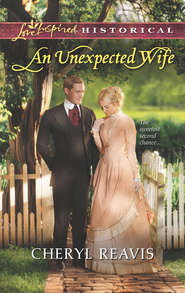По всем вопросам обращайтесь на: info@litportal.ru
(©) 2003-2024.
✖
The Bride Fair
Настройки чтения
Размер шрифта
Высота строк
Поля
“Dare I hope arrangements have been made regarding my quarters?” he asked after a moment.
“Ah—yes, Sir. The major was thinking to put you in the same house as was Colonel Hatcher. It could get kind of crowded over there, though, Sir, if Miss Markham happened to move a bunch of kinfolk in now that Colonel Hatcher is gone. It might be you’d be wanting a hotel, Sir,” he added hopefully. “Mansion House or Howerton’s right across the street—”
Max looked at the sergeant major. So. Miss Markham—apparently the woman who had met him at the station—had a champion in this sergeant major, one who wanted the new colonel to know that his behavior regarding her would be duly noted.
But Perkins could rest easy. Max had no designs on Miss Markham’s virtue. He did, however, wish to continue to inconvenience her. He wasn’t all that different from the men under his command. He had just been on the receiving end of a Rebel woman’s disdain, and, like his men, he took it personally.
“No,” Max said. “The Markham house will suit me. If there are additions to the household and I find it too noisy, I have the authority to thin them out. My belongings will be sent here from the station. Have them moved to the house—and make sure the Markham pantry is full and there is somebody to cook and to orderly. And find me a decent mount so I can see about this latest fire. Then, I want you to take some men and close this town down. Every store, every saloon, every bar and grog shop. And the whorehouses, too, while you’re at it. All church services and public and private gatherings are canceled until further notice. The citizens are to be off the streets and in their homes. Start with that bunch downstairs.”
“Yes, Sir! Anything else, Sir!”
“I want all these papers sorted, by date and by urgency—and then I want a burial detail.”
“Burial detail, Sir?”
“That’s what I said. And find me some small pine blocks—like so,” he said, showing him the size with his hands. “Make sure they’re finished—no bark—scraps from a lumber mill if there is one—but you can put that at the bottom of the list for now.”
“Yes, Sir!” Perkins gave a smart salute and left a happy man, in spite of Max’s choice of residence and his mishmash of orders. Occupation duty was tedious at best, and enacting what amounted to martial law was clearly more to the soldier’s liking.
Max sat at the desk, then reached for the red-velvet box again, turning it over in his hands before he opened it. After a moment he abruptly closed the box and put it into his uniform pocket.
Chapter Two
Maria Markham stopped abruptly in the wide center hallway, listening again for the sound of an approaching wagon. The front door was shut, but the downstairs windows were still open to let in the evening breeze until the mosquitoes began to swarm. She stood there, her sense of dread completely taking her attention away from the task of closing up the house for the night and lighting more lamps than they could afford to light.
She had been waiting for the new colonel all afternoon, and she still had no idea what she would do when he finally arrived. She knew what she would like to do, of course. She would like to bar the door and turn him away. She would like to send him and his kind back to whatever hellish place they had come from.
Pennsylvania.
Colonel Woodard came from Pennsylvania. He had served in Rush’s Lancers, a supposedly elite cavalry regiment made up of rich young men from Philadelphia society. His having been a Lancer was likely the reason he was in such an elevated position now—or so her father said. Her father made a point of keeping up with what he considered the pertinent details regarding the occupation army, and he was the one responsible for the new colonel’s being billeted in the house in the first place—and for the two others before him.
“It is for the money, Maria Rose,” he’d explained patiently when she had protested having yet another “guest,” as if she didn’t already know what dire financial straits they were in. The only problem with that logic was that the Yankees never paid for anything—least of all their housing. They “appropriated” whatever they wanted all over town and handed out vouchers the quartermaster never got around to honoring. The town was forever sending some kind of delegation to military headquarters to broach the subject of monies owed, but far as she knew, her father had received no rent payment the entire time, Hatcher, the previous commander had been living here. She had no expectations that this new one would be any different.
Colonel Woodard.
The man she was having to light the lamps for, because she thought he would come into the house unannounced, barred door or not, and she did not want to encounter him in the dark.
She had been afraid of him today in the buggy. He had been civil enough, but his civility didn’t hide what she believed to be his true nature. She realized immediately that he didn’t suffer fools gladly, but, for whatever reason, he chose to keep a tight rein on his emotions. Even so, she could feel how volatile they were, how close to the surface, and he had a kind of dangerous intensity about him she found more than a little disconcerting. She had no idea what people must have thought, seeing them riding out to the prison like that. It wasn’t proper, and the colonel knew it. He made it very clear that the delicate sensibilities of the people in this town meant nothing to him.
She was certain she heard a wagon now, and she stepped quickly into the parlor so that she could peep out the front window. If it was Colonel Woodard, she would take herself to another part of the house. The last thing she wanted the Yankee to think was that she’d been dancing in attendance by the front door on his account.
It was nearly dark, but she could see the wagon clearly enough—one of the farmers making a delayed start home, probably because of the fire. Every able-bodied man had been pressed into service. She couldn’t see any flames now, or even a glow in the sky, but she could still smell the smoke. The wagon rattled on by, leaving nothing in its wake but the sounds of a warm summer night.
She took a quiet breath and let the resentment she’d been keeping at bay wash over her. She had tried so hard to talk her father out of letting another one of them into the house. It was bad enough having to encounter occupation soldiers all over town. They were always underfoot on the streets and in the shops. Some actually came to church and participated in the services—much to the delight of the young girls, who were more than willing to overlook a Yankee officer’s part in the late war for the possibility, however remote, of matrimony.
To that end, some of them had raised simpering to a high art. It had gotten to the point that she could hardly bear to witness it, and she could expect a bevy of eager young females at the front door as soon as word got around that the new—and possibly unmarried—colonel was billeting with the Markhams. If—when—they discovered that he was supposedly from a well-to-do family, too, she would be absolutely inundated with visitors, whether she wanted them or not.
Maria gave a quiet sigh. Perhaps she shouldn’t blame the girls—or their mothers, who must surely sanction their behavior. Who else was there to marry? The war had decimated the Confederacy’s young men. So many of them were dead or invalid, and it was a bitter thing for those who had survived more or less intact to have to live now in a conquered South. Some of them made no pretense at even trying. They took themselves off to California or to Mexico or to South America, leaving the uncertain resurrection of their homeland to whoever remained.
She resented their departure as much as she resented the new colonel’s presence in the house. Having Colonel Woodard here was a classic example of adding insult to injury, and she simply didn’t understand why her father couldn’t see that. Both his sons—her beloved brothers—had died at Gettysburg. Quiet, scholarly Rob, who had treated her as an intellectual equal simply because she was so eager to learn about matters beyond the kitchen and household. And mischievous, lighthearted Samuel, who could always make her laugh.
She missed them both terribly, and her only comfort was that they had been spared seeing what life here had become. Everything had changed. It wasn’t simply the deprivations, the lack of food and money. It was the lack of joy and living day after day in relentless, all-prevailing sorrow.
She caught a glimpse of herself in the gilt-framed mirror on the far wall. The mirror had been cracked three years ago by one of General Stoneman’s raiders in an effort to get it out of the house before one of his superiors saw him trying to steal it. She moved to the side so that she could see herself better and immediately wished she hadn’t. She was so tired, and she looked it.
What has happened to me?
Her brothers would not have recognized her. She hardly recognized herself anymore. She had never been a beauty, but she had been a cheerful and optimistic person.
Once.
People had enjoyed her company. She had never lacked for invitations to balls and parties. Billy Canfield had wanted to marry her. He had spoken to her father, and they had received the blessings of both sets of parents. It seemed so long ago now, but she had that one small consolation to hang on to, at least. She had once been asked—and only she would ever know that his asking had meant nothing.
But her life was about to change for the worse, whether the new colonel billeted himself here or not. She had no hope of escaping her fate and very little time remaining before she was found out. If only she were devious enough and fetching enough to join the younger girls in their relentless, giggling quests for a husband. A husband would solve everything—even if it were one of them—if she could act quickly enough and if she could put aside the dishonor of such a venture and somehow dredge up the self-confidence to attempt it. She still smarted at the memory of Colonel Woodard’s scrutiny at the train station. His assessment of her had been subtle—not at all like the leering she’d come to expect from Colonel Hatcher and his kind. But it had been no less upsetting. She had seen the new colonel study her face, her breasts—and then totally dismiss her.
Like Billy.
Someone rapped sharply on the front door, making her jump. She peered out the window again. A carriage had stopped out front, but she didn’t recognize it. Apparently the colonel had chosen a conveyance in keeping with his position this time—or perhaps there had been no lone women in buggies handy.
The rapping came again, much louder this time.
“Maria Rose!” her father called from his upstairs sitting room. “Will you answer the door or must I!”
“I’m getting it, Father,” she called back, recognizing the threat for what it was. He was looking for an excuse to come downstairs and drink whiskey with a bunch of soldiers—even if they were in the wrong army—instead of coddling his bad heart as the doctor had ordered. She loved her father dearly, but he had to be the most exasperating man in all of Christendom. When his health improved even a little, he never concluded that the doctor’s regimen was working. Instead, he promptly decided that it wasn’t needed any longer. She ran herself ragged trying to keep him from overdoing, failing and then feeling guilty for his numerous setbacks. It had been the same when her mother was living. Somehow his illness was entirely their responsibility. If he felt any personal obligation to follow his doctor’s advice regarding his own health, she certainly couldn’t tell.
“Maria Rose!” her father yelled again.
“I heard you, Father!”
She took a deep breath to brace herself for the coming ordeal, but the door flew open before she could get to it.
“Miss,” the soldier standing on the porch said. “I have Colonel Woodard’s trunk and belongings.”
He didn’t wait for her to give him leave to enter. He motioned two other soldiers to hurry along with the baggage and pushed his way into the house, forcing her to step back to give him room.
“Where will the colonel be quartered, miss?” he asked.
“Wherever he likes,” she said, because the question was merely a token one, and they both knew it. It wasn’t for her to say. She had had enough dealings with these people to understand the fine points. Colonel Woodard wasn’t a guest; he was a conqueror. He could pick and choose his accommodations as he pleased—and would, most likely—even if it meant she or her father would have to vacate them.
“Leave that here,” the soldier said to the two men carrying the trunk and a number of satchels and leather cases.
Two more soldiers came in through the front door loaded down with wooden boxes, a basket of eggs, a ham and three sacks of flour, tracking red mud on the bare wood floor all the way. The floor was walnut—short pieces done in an intricate chevron pattern that caused much admiration among visitors to the house and cleverly hid the fact that, at the time, the scrap pieces were all her father could afford. It was yet another example of his resourcefulness, but it was she who would have to get down on her hands and knees to brush the mud out of the crevices.
“The colonel’s provisions, miss. Light the way to the pantry, if you please.”
She didn’t please, but she picked up the lamp from the hall table and carried it in the direction of the kitchen. They would have no problem locating which larder had been set aside exclusively for the colonel. It would be the one protected from civilian pilfering by a heavy padlock to which no one in the household had the key.
She looked over her shoulder toward the open front door, still expecting the colonel himself, but she could see no soldiers in the yard or in the carriage.











